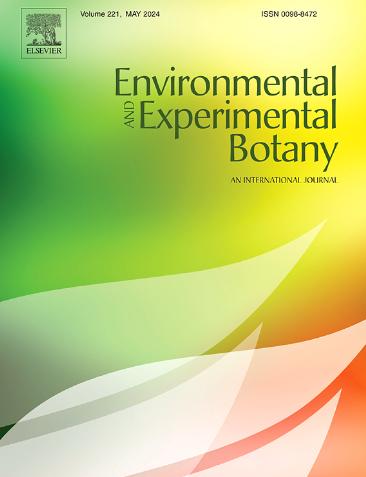氮肥对乌头内生细菌的调节作用。以及药材的质量
IF 4.7
2区 生物学
Q2 ENVIRONMENTAL SCIENCES
引用次数: 0
摘要
乌头草。是一种具有重要经济价值的传统药用植物。长期使用化肥或高氮投入可减少药效学化合物的积累,并对生态系统产生不利影响。虽然氮肥对土壤微生物的影响已被广泛研究,但氮肥如何调节内生细菌群落,从而影响寄主植物次生代谢物的积累尚不清楚。本研究假设适度施氮通过调节内生细菌群落从而改变植物代谢途径来促进生物碱积累。田间试验结果表明,适度施氮(N2: 350 kg N ha⁻¹)可显著提高黄颡鱼总生物碱含量14.45 % (P <; 0.05)。高通量16S rRNA基因测序结果表明,适度施氮显著提高了内生细菌多样性(Chao 1和Shannon指数,P <; 0.05),改变了内生细菌群落组成(R²= 0.5081,P = 0.001)。在不同的氮处理下,共鉴定出64个内生细菌类群。其中N2组20个,其中16个与生物碱含量呈正相关。后续实验证实枯草芽孢杆菌JY-7-2L通过产生生物碱并诱导宿主代谢途径,显著增强了A. carmichaelii生物碱的积累(P <; 0.05)。进一步分析发现,枯草芽孢杆菌JY-7-2L代谢产物显著上调了与信号转导和生物碱合成相关的基因,从而促进了A. carmichaelii生物碱的积累。本研究表明,合理施肥可显著增强植物与微生物的相互作用,特别是通过枯草芽孢杆菌JY-7-2L促进生物碱积累的作用。这些研究结果为优化A. carmichaelii栽培的氮肥施肥策略,将枯草芽孢杆菌JY-7-2L菌株开发为环境友好型生物肥料,促进农业可持续发展奠定了基础。本文章由计算机程序翻译,如有差异,请以英文原文为准。
Nitrogen fertilization modulates the endophytic bacteria of Aconitum carmichaelii Debx. and the quality of medicinal materials
Aconitum carmichaelii Debx. is a traditional medicinal plant with substantial economic value. Prolonged use of chemical fertilizers or high nitrogen (N) input may reduce the accumulation of pharmacodynamic compounds and adversely influence ecosystems. Although the impact of N fertilization on soil microorganisms has been extensively investigated, how N fertilization modulates the endophytic bacterial community and thus affects secondary metabolite accumulation in the host plant remains unclear. This study hypothesizes that moderate nitrogen fertilization enhances alkaloid accumulation by modulating endophytic bacterial communities, thereby altering plant metabolic pathways. The field experiment demonstrated that moderate N fertilization (N2: 350 kg N ha⁻¹) significantly increased the total alkaloid content in A. carmichaelii by 14.45 % (P < 0.05) compared with that in the zero N control. High-throughput 16S rRNA gene sequencing indicated that moderate N fertilization significantly increased the diversity (Chao 1 and Shannon index, P < 0.05) and altered the community composition (R² = 0.5081, P = 0.001) of endophytic bacteria. 64 endophytic bacterial taxa were identified differentially abundant taxa varying N treatments. Among them, 20 belonged to the N2 group, 16 of which demonstrated a strong positive correlation with alkaloid contents. Subsequent experiments confirmed that Bacillus subtilis JY-7–2L significantly enhanced alkaloid accumulation in A. carmichaelii (P < 0.05) by producing alkaloids and inducing host metabolic pathways. Further analysis revealed that the metabolites from B. subtilis JY-7–2L remarkably up-regulated the genes related to signal transduction and alkaloid biosynthesis, thereby enhancing alkaloid accumulation in A. carmichaelii. This study demonstrated that rational fertilization significantly enhances plant–microbe interactions, particularly through the role of B. subtilis JY-7–2L in promoting alkaloid accumulation. These findings laid the foundation for optimizing the N fertilization strategy for A. carmichaelii cultivation and developing B. subtilis JY-7–2L strain into environmentally friendly biofertilizers to advance agricultural sustainability.
求助全文
通过发布文献求助,成功后即可免费获取论文全文。
去求助
来源期刊

Environmental and Experimental Botany
环境科学-环境科学
CiteScore
9.30
自引率
5.30%
发文量
342
审稿时长
26 days
期刊介绍:
Environmental and Experimental Botany (EEB) publishes research papers on the physical, chemical, biological, molecular mechanisms and processes involved in the responses of plants to their environment.
In addition to research papers, the journal includes review articles. Submission is in agreement with the Editors-in-Chief.
The Journal also publishes special issues which are built by invited guest editors and are related to the main themes of EEB.
The areas covered by the Journal include:
(1) Responses of plants to heavy metals and pollutants
(2) Plant/water interactions (salinity, drought, flooding)
(3) Responses of plants to radiations ranging from UV-B to infrared
(4) Plant/atmosphere relations (ozone, CO2 , temperature)
(5) Global change impacts on plant ecophysiology
(6) Biotic interactions involving environmental factors.
 求助内容:
求助内容: 应助结果提醒方式:
应助结果提醒方式:


